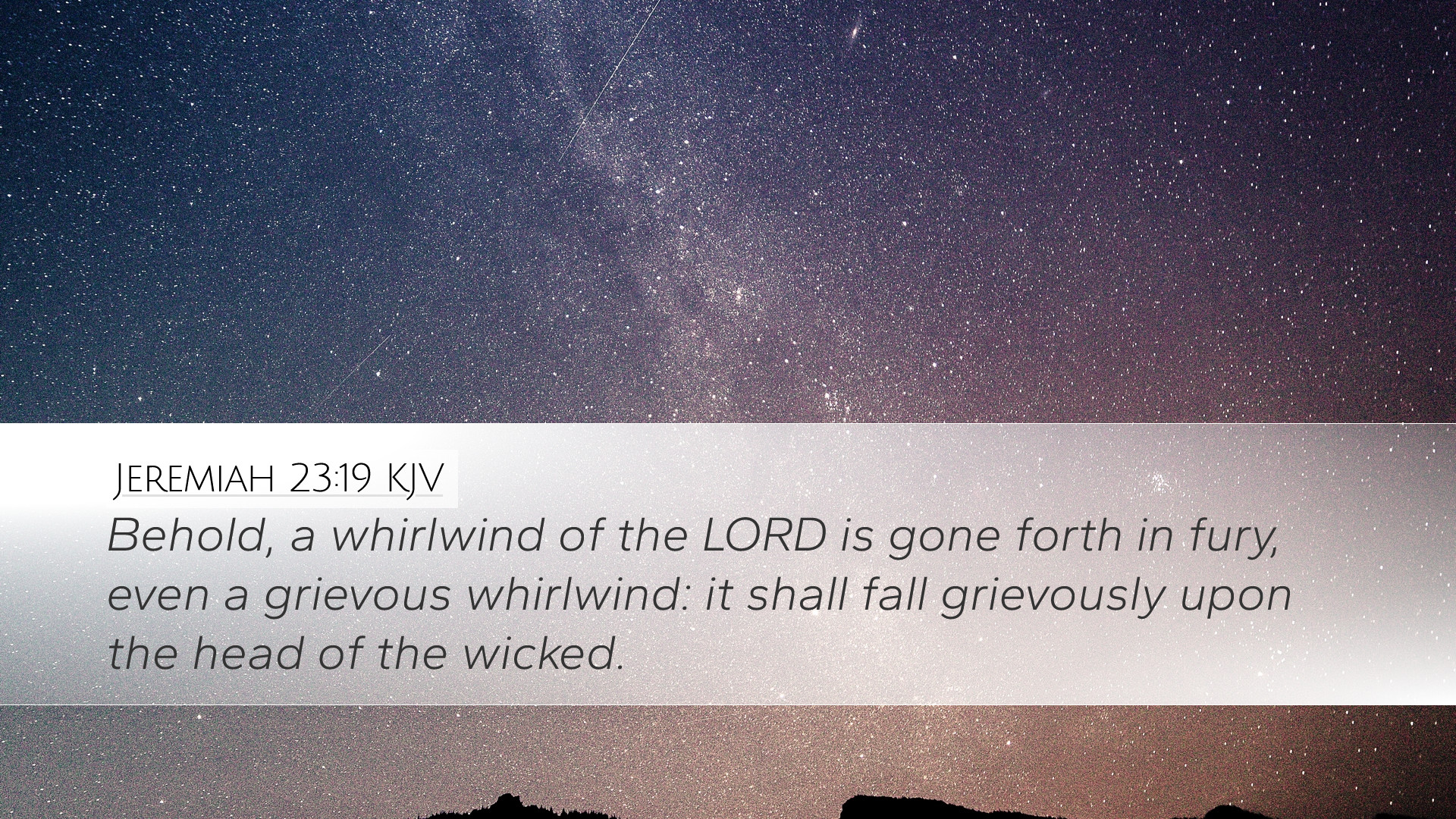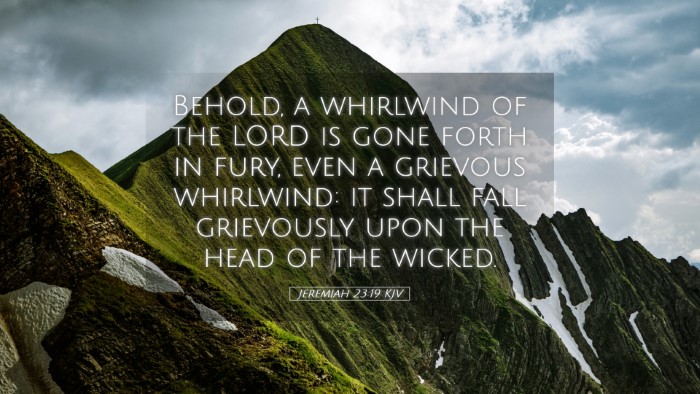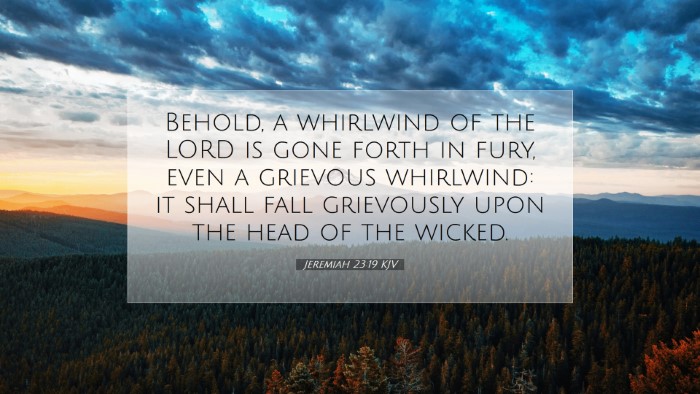Commentary on Jeremiah 23:19
Jeremiah 23:19 states: "Behold, a whirlwind of the LORD is gone forth in fury, even a grievous whirlwind: it shall fall grievously upon the head of the wicked." This verse expresses a profound warning concerning the impending judgment of God upon the wicked and serves as a pivotal message in the prophetic ministry of Jeremiah.
Contextual Background
In this chapter, Jeremiah addresses the false prophets and leaders in Israel who lead the people astray, thus warranting severe divine retribution. The historical context of this verse highlights the socio-political and spiritual crisis of Judah on the eve of Babylonian captivity. False security and misleading prophecies abounded, prompting God to communicate His impending judgment through the prophet Jeremiah.
Insights from Public Domain Commentaries
Matthew Henry’s Commentary
Matthew Henry emphasizes the vivid imagery of a whirlwind to symbolize the uncontrollable and powerful nature of God’s wrath. He points out that just as a whirlwind stirs the air and creates chaos, so too will God's judgment bring disorder upon the wicked. Henry elaborates on how this whirlwind signifies both suddenness and the stirring of God's righteous anger towards those who deceive His people.
He further suggests that the “grievous whirlwind” indicates the intensity and severity of God’s impending judgment. Henry notes that such judgment is not arbitrary but stems from a righteous response to wickedness. The reference to the “head of the wicked” portrays that no one is exempt from God’s justice; even those who seem to be in power will not escape divine scrutiny.
Albert Barnes’ Notes
Albert Barnes provides a more detailed exegesis of the term "whirlwind," explaining its scriptural significance as a common metaphor for divine judgment. He identifies that in Hebrew literature, whirlwinds are often associated with divine presence and action, suggesting that God Himself is active in bringing calamity upon unrepentant sinners.
Barnes stresses the certainty of this judgment, as indicated by the phrase "is gone forth in fury." He discusses how the present tense demonstrates the immediacy of God's plans versus the false assurances propagated by the leaders of Judah. According to Barnes, this serves as a crucial reminder for both past and present audiences – that God's judgment is both inevitable and imminent.
Furthermore, Barnes encourages careful examination of one’s life in light of the divine nature of judgment. He invites leaders and teachers to be vigilant against the lure of falsehood and to shepherd their congregations with truth, as the consequences of leading others away from God are dire.
Adam Clarke’s Commentary
Adam Clarke elaborates on the figurative language used by Jeremiah, relating it to ancient cultures’ understanding of storms and tempests as manifestations of divine will. Clarke articulates the dual nature of God's message here: it is both a warning and a declaration of fate for the wicked. He highlights how the term "grievous" underscores the anguish associated with turning away from God's law.
Clarke also makes an important theological point about God’s character as a righteous judge, encouraging readers to realize that God's justice is not merely retaliatory but fundamentally protective of those who seek righteousness. In this light, Clarke invites leaders to cultivate environments that promote true piety and adherence to God's commandments.
Additionally, Clarke emphasizes the necessity for self-examination within the body of believers to avoid falling into the same traps as those being addressed by Jeremiah. He warns that complacency often leads to spiritual blindness and the acceptance of false teachings.
Theological Implications
The rich insights provided by these commentators converge to highlight key theological implications drawn from Jeremiah 23:19.
- God’s Sovereignty: The whirlwind symbolizes God's absolute power and sovereign control over all creation. It underscores the belief that nothing happens outside God's divine authority, including the judgments He pronounces.
- Righteous Judgment: The phrase “head of the wicked” points to the principle of justice in the character of God. This verse serves as a reminder that God's judgments are directed against moral evil, revealing His commitment to righteousness.
- Call to Repentance: Implicit within the prophecy is a call for repentance. The warning serves to stir the hearts of the wayward, beckoning them to turn back to God before the impending whirlwind arrives.
- Pastoral Responsibility: For those in positions of leadership within the church, there is a weighty responsibility to teach the truth and avoid sowing seeds of false security among congregants. The dire consequences faced by both false prophets and their followers remind pastoral leaders of the importance of their calling.
Practical Applications
For pastors, theologians, and students of Scripture, Jeremiah 23:19 serves as both a challenge and an encouragement. The following applications are encouraged:
- Embrace the Weight of Responsibility: Leaders must understand the significance of their role in guiding others towards truth. This entails teaching sound doctrine and maintaining integrity in their ministry.
- Foster a Culture of Accountability: Encourage congregants to engage in self-examination and repentance, recognizing areas where they may be led astray.
- Stay Vigilant Against False Teachings: Continuous vigilance is required against the subtle infiltration of falsehoods. Engage with Scripture actively to discern truth from error.
- Promote God’s Justice: Convey to congregations that God's justice is part of His loving nature, not detrimental but beneficial for the establishment of His Kingdom on earth.
Conclusion
In closing, Jeremiah 23:19 serves as a powerful reminder of God's unyielding justice and the necessity for faithful leadership grounded in truth. By heeding the insights of historical commentaries and applying their teachings, individuals and churches alike can foster environments that align with God's will and reflect His glory in a world fraught with deception.


